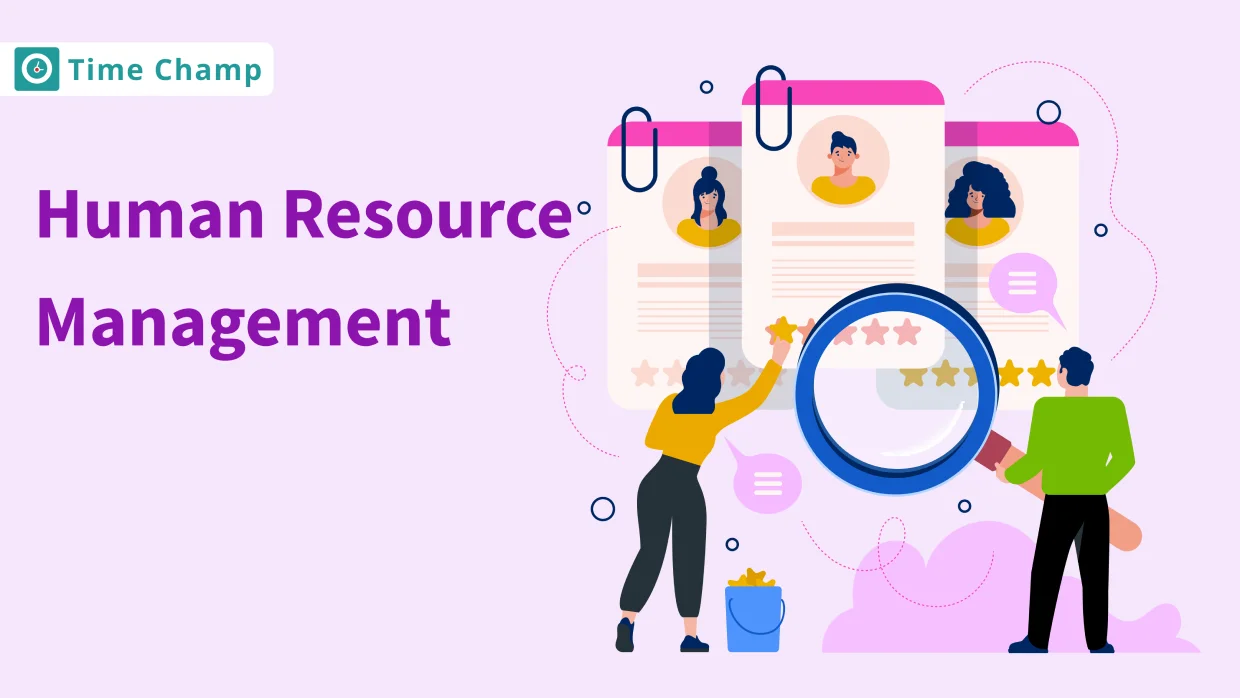What is Human Resource Management?
HRM stands for Human Resource Management, it a strategic approach to managing an organization’s most valuable asset – its people. It involves planning, organizing, and overseeing human resources to enhance workplace productivity, employee satisfaction, and overall business performance.
HRM serves as a link between the company’s goals and its employees. It ensures that the company has the right people with the right skills to succeed. Sometimes this activity is called human capital management which entails seeing people as valuable assets who can contribute to the success of the company.
HR technology plays a very important role in human resource management. This includes using computer systems and software to perform HR functions more efficiently, such as tracking employee hours, administering benefits, and recruiting new employees.
The human resource department is the team at a company that handles all of the HR Management tasks concerned with the management of human resources within organizations, focusing on policies and systems related to employee benefits, recruitment, training and development, performance appraisal, payroll, and reward management. It also deals with organizational change and industrial relations. They are responsible for ensuring that the company’s workforce is satisfied, skilled, and well-organized. They play an important role in creating a positive work environment where employees want to work and can perform at their best.
In essence, HRM is about effectively managing the human resources of a business to encourage growth and success.
Objectives of Human Resource Management
1. Societal Objectives
HRM doesn’t just exist within the walls of a company; it also considers the world outside.
- Making a Difference: HR helps organizations act responsibly, whether it’s by promoting ethical practices, respecting labor laws, or supporting sustainability efforts.
- Encouraging Inclusion: Creating a diverse workplace isn’t just a buzzword, it’s about making everyone feel welcomed and respected.
- Community Connection: Companies have an impact on their communities, and HR ensures that impact is positive.
At its core, human resource management helps organizations be better neighbors and global citizens.
2. Organizational Objectives
A company’s success depends on its people. HR ensures that every employee is equipped to contribute meaningfully.
- Building Strong Teams: HR brings in people who have the right skills and also fit well into the company culture.
- Driving Progress: By aligning employee efforts with company goals, HR keeps everyone on the same page.
- Ensuring Compliance: HR stays on top of regulations to protect the company from risks.
In simple terms, HR makes sure the organization is well-prepared to achieve its goals.
3. Functional Objectives
HR needs to run like a well-oiled machine to support the rest of the organization.
- Making Things Easy: HR simplifies processes like hiring, payroll, and performance reviews so employees can focus on their work.
- Balancing Priorities: Whether it’s addressing employee needs or business requirements, HR maintains harmony.
- Adapting to Change: Workplaces evolve, and HR leads the way in managing those transitions.
When HR operates efficiently, it creates a ripple effect of positivity across the organization.
4. Personal Objectives
HR isn’t just about the company, it’s about the people who make the company what it is.
- Championing Growth: HRM helps the employee to pursue his/her goal by providing training and career development opportunities.
- Supporting Well-Being: From mental health resources to work-life balance initiatives, HR looks out for employees.
- Recognizing Contributions: Celebrating achievements fosters a sense of belonging and motivation.
When employees feel supported, they’re more engaged, productive, and satisfied.
Additional Objectives of HRM:
- Attaining Organizational Aims: Helping to achieve general organizational objectives in the best possible manner by designing productive human resource strategies.
- Work Culture: Developing a productive work environment as well as culture.
- Team Building: Promoting the feeling of teamwork and unity among employees.
- Training and Development: Offering continuous training and development opportunities for employees.
- Motivation of the Employees: Helping to motivate and engage the workforce.
What are the Responsibilities of HR Resource Management
Human Resource Management is at the heart of every organization, and its responsibilities are numerous because all these have to work towards the good and efficacy of the workers. Thus, let’s discuss each responsibility one after another:
1. Finding and Hiring Great Talent
Recruitment goes beyond simply filling an open position; it’s about identifying individuals who resonate with the company’s goals and values. HR professionals write clear job descriptions, scout candidates, conduct interviews, and make sure that each of the new hires is set up for success.
Why it matters: The right person in the right role can make all the difference. However, the wrong fit can lead to missed goals, frustrated teams, and wasted potential.
2. Helping Employees Grow
HR teams play a key role in supporting learning. They create onboarding programs, organize skill-building workshops, and ensure employees have opportunities to grow. From a new hire’s first day to their long-term development, HR is there to guide the way.
Why it matters: Investing in employees’ growth isn’t just good for them, it’s great for the business, too.
3. Keeping Performance on Track
Performance management mainly needs just two things, that are clear expectations and effective feedback. HR ensures that every employee understands what’s expected of them and supports managers in tracking progress through tools like appraisals and regular check-ins.
Why it matters: When everyone knows where they stand, it’s easier to hit goals and celebrate wins.
4. Designing Fair Pay and Perks
Compensation goes beyond salaries. HR builds benefits packages that attract and retain top talent, think healthcare, retirement plans, and flexible work options.
Why it matters: If the employees feel valued and motivated enough, they are most likely to stay longer with the organization.
5. Building a Positive Work Culture
A workplace isn’t just where people work, it’s where they spend a big part of their lives. HR teams work to create an environment where people feel appreciated and connected. This might include team-building activities, recognition programs, or just making sure everyone’s voice is heard.
Why it matters: Happy employees create successful companies.
6. Making Sure Everything’s Legal
Labor laws are tricky and HR keeps the organization informed about them, so the organization remains compliant. Whether it is workplace safety or any anti-discrimination rule, HR makes sure that the company policies are always up-to-date and employees are therefore protected.
Why it matters: Staying compliant avoids legal trouble and shows employees they’re in good hands.
7. Resolving Workplace Issues
No workplace is free from conflicts. HR comes forward to balance and resolve disputes, without disturbing the work culture and also ensures everyone can get back and focus on their work.
Why it matters: Addressing conflicts quickly helps maintain a healthy, productive environment.
8. Planning for the Future
HR Management doesn’t just think about today, they’re planning for tomorrow, too. Workforce planning and succession strategies help ensure the business is ready to grow and adapt to changes.
Why it matters: Being prepared keeps the business running smoothly, no matter what.
9. Fostering Inclusion and Belonging
A diverse and inclusive workplace isn’t just a buzzword, it’s a necessity. HR department takes initiatives that encourage equity, and inclusion of all races and genders ensuring everyone feels like they belong.
Why it matters: A culture of inclusion fuels creativity and collaboration.
10. Prioritizing Safety and Well-Being
HR doesn’t just focus on work, they also care about employees’ physical and mental health. From safety protocols to wellness programs, HR keeps employee well-being front and center.
Why it matters: Healthy employees are happy and productive employees.
Skills Every HR Professional Should Have
To handle all these responsibilities, HR professionals need a mix of practical skills and personal qualities. Here’s what makes them shine:
- Great Communication: Being clear and approachable to ensure that everyone’s on the same page.
- Leadership: Leading by example and inspiring your team to reach new heights.
- Building Positive Relationships: Fostering an environment where everyone feels valued and heard.
- Decision-making: Weighing the options carefully and choosing what’s best for everyone involved.
- Problem-solving: Tackling challenges head-on and finding solutions that make sense.
- Adaptability: Embracing change with ease and making the most out of every situation.
- Technical Skills: Knowing all the tools inside and out to keep things running smoothly.
- Emotional Intelligence: Understanding people’s feelings and responding in a way that helps everyone.
- Active Listening: Really hearing what others have to say, so you can understand their needs.
- Conflict Resolution: Finding common ground and turning disagreements into productive conversations.
- Staying Legally Savvy: Keeping up with laws to make sure everything’s above board.
- Confidentiality and Ethics: Keeping sensitive information safe and always doing the thing that is right.
Roles in Human Resource Management
Let’s see what roles human resource management offers.
1. HR Manager
HR Managers make sure everything in the HR department aligns with the company’s goals. They’re the main problem-solvers, and they help to create a work environment where employees feel valued and supported.
2. Recruitment Specialist
These are the people who bring new talent into the company. From posting job openings to conducting interviews, they make sure the best candidates join the team.
3. Training and Development Manager
Training Managers focus on helping employees grow in their careers. They design some programs that give employees the skills they need to succeed and continue progressing within the organization.
4. Compensation and Benefits Manager
This role is all about ensuring the employees are fairly compensated. Compensation and Benefits Managers make sure pay is competitive with industry ranges and that the benefits packages meet employees’ needs.
5. Employee Relations Specialist
Employee Relations Specialists are the people who are the go-to for resolving issues that come up between the employees and the company. They foster a positive, respectful workplace by addressing conflicts and maintaining good communication.
6. HR Generalist
HR Generalists wear many hats. They handle everything from hiring to handling employee issues to ensuring the company complies with the HR regulations. They’re essential for keeping the HR department running efficiently.
7. HR Assistant
HR Assistants support the HR team by handling administrative tasks like scheduling interviews and organizing employee records. They keep the team organized and ensure operations run smoothly.
8. Health and Safety Officer
Health and safety officers mainly focus on keeping the workplace safe. They make sure employees follow safety protocols and that the company adheres to all the health regulations.
9. Diversity and Inclusion Specialist
Diversity and Inclusion Specialists make sure that everyone feels welcome at work. They promote an inclusive culture where all employees, no matter their background, feel respected and valued.
10. Payroll Administrator
Payroll Administrators ensure employees get paid correctly and on time. They manage salaries, tax deductions, and other financial aspects of employee compensation.
11. Organizational Development Specialist
These specialists work on improving company processes and employee performance. They focus on making teams more efficient and helping the company grow by developing even better strategies.
12. HR Compliance Officer
HR Compliance Officers make sure the company follows labor laws and regulations. They ensure that the company stays on the right side of the law while also protecting employee rights.
How Does HRM Work?
Let’s head into how HRM not only changes the work environment but also brings many benefits to the table.
Human Resource Management covers everything from operational duties like recruitment and payroll to strategic processes including planning and analytics. Each of these functions is interconnected, contributing to the overall well-being and the success of the organization. Using an effective HRM, companies can create a very productive, safe, and satisfying work environment for their employees.
HRM, or human resource management, is a crucial component of any business, large or small. It involves managing people, and the employees to ensure the company’s success. This includes hiring, training, paying, and making sure employees are happy and doing their best.
In small companies, HRM can be handled by just one single person or a small team. They handle everything from recruiting new employees to implementing training programs that are needed for employees. For example, a small local business may employ an HR manager who takes care of all HR duties.
In larger companies, like big technology firms or multinational corporations, human resource management is a really big operation. These organizations often have complete HR departments staffed by many HR professionals, where each specializing in a particular area. Like, for example, a large company such as Google has a very complete HR structure with many different roles.
In the real world, how HRM operates differs from company. For small organizations, HR tasks may be a bit easier, like direct communication between the boss and employees. HR is much more complex in large organizations, with many different structures and procedures, given the relatively large size of employees and the demand for numerous legal requirements.
Whether at a small shop or an enormous corporation, HR professionals are the keepers of happy workers, equipped with skills, and integrated into organizational goals.
Benefits of Human Resource Management for Businesses
There are several benefits of having human resource management for any business, here I have listed some of them, take a look.
1. Finds the Right People
HR is more concerned with hiring skilled individuals, especially those who are right for the job and those who fit well with the company’s values. Doing this helps to avoid internal team conflicts and to ensure that teams are efficient in their own operations.
2. Helps Employees Grow
Professional growth is key to a motivated workforce. HR provides the employee with training needs, initial career guidance, and developmental activities that can increase the employee’s commitment levels and keep them ready for the future.
3. Creates a Great Work Environment
It is crucial to have a friendly environment that will make the employees happy. HR fosters a positive atmosphere by promoting collaboration, addressing concerns, and recognizing accomplishments.
4. Retains Top Talent
Keeping employees satisfied and loyal is a major HR priority. By offering competitive benefits, career growth opportunities, and a supportive culture, HR reduces turnover and builds a stable workforce.
5. Ensures Fairness and Compliance
HR makes sure the company operates fairly and ethically, complying with all the local and national employment laws of where the company resides. Doing this protects the business along with its employees and also creates a feeling of trust and security among all the employees.
6. Solves Conflicts and Challenges
Conflicts and disagreements can be harmful to any company, but they keep happening often, this is where HR comes into play. They ensure conflicts are handled constructively, helping teams work together harmoniously.
7. Boosts Productivity
Human resources evaluate how the work gets done by organizing the roles effectively, providing necessary tools, and ensuring everyone stays focused on their goals.
8. Builds a Strong Company Reputation
A good HR team helps create a workplace that people want to be part of. Happy employees spread the word, making it easier to attract top talent and customers alike.
9. Aligns Goals Across the Team
HR fills in the gap between an individual’s role and the company’s overall vision. They ensure that every person understands how their work aids to the bigger picture.
10. Keeps Morale High
Recognizing achievements, celebrating milestones, and offering support during tough times are some of the ways HR boosts morale, creating a motivated and resilient team.
11. Supports Employee Well-being
From wellness programs to flexible work options, HR takes steps to ensure employees feel healthy and balanced, both mentally and physically.
12. Encourages Diversity and Inclusion
HR encourages a very inclusive work environment, where each employee feels valued. This leads to fresh ideas, improved collaboration, and a stronger team dynamic.
13. Prepares for Change
Whether it’s adopting new technology or adapting to market trends, HR helps employees navigate change with confidence and readiness.
14. Drives Innovation
Human resources encourage employees to think creatively and share their ideas. They do this by creating a workplace where innovation thrives and collaboration becomes second nature.
15. Fosters Team Spirit
HR organizes activities, team-building exercises, and open communication channels to strengthen connections among employees, making the workplace feel more like a community.
Tips for a Better Human Resource Management
1. Connect with Your Team
Strong relationships are the only foundation of great HR management. HR professionals should get to know their employees well. This means understanding their strengths, weaknesses, and career goals. For example, an HR manager might hold regular coffee meetings with employees to chat about their jobs and personal development. This personal touch makes employees feel valued and understood.
But wait, there’s more to it than just meetings, it’s about truly understanding each employee.
2. Stay Updated with HR Trends
The field of human resources management is always changing. HR professionals should continue to learn about new HR trends and best practices. For example, an HR manager may attend workshops or webinars on the most recent HR technologies or laws. Staying informed helps them to manage more effectively and offer the most up-to-date recommendations to the organization.
And here’s the kicker: staying updated doesn’t just mean reading articles, but it involves actively engaging in learning opportunities.
3. Encourage Open Communication: Listen and Share
Open communication is the key to human resource management. HR should be receptive to employees’ concerns and respond informatively regarding organizational policies, and changes ahead. For example, if a company is implementing a new work policy, HR can arrange a meeting to explain it and answer questions regarding the topic. Being friendly and honest makes the employees comfortable and makes things become clearer.
4. Celebrate Success
Here’s the best part: Recognition is not just about doing grand gestures, sometimes, a simple thank you makes all the difference.
Recognizing and rewarding employees’ efforts is important. This can be as easy as a ‘thank you’ email or just as formal as a monthly employee recognition program. For example, an HR professional could send out a company-wide email congratulating a team on completing a large project. Recognizing accomplishments improves morale and motivates employees.
But let’s not forget, that fostering work-life balance goes beyond policy changes; it’s about showing genuine concern for employees’ personal lives.
5. Care for Your Team
Finally, promoting a healthy work-life balance is crucial. HR can develop policies that allow for flexible working hours or remote work opportunities. For instance, instead of having strict working hours; HR managers can organize what is known as ‘Flex Fridays’, where workers are supposed to leave early in case they have finished working. That shows that the corporate organization cares about its employee’s well-being outside of work.
By following all these practices, HR professionals can create a positive and productive work environment for their employees.
Conclusion
Human Resource Management (HRM) isn’t just about paperwork, it’s what keeps an organization running smoothly by aligning company goals with what employees need and want. From the moment someone is hired to their ongoing development and growth, HRM plays a role in making sure employees feel valued, their rights are respected, and their hard work is recognized. This is why HRM is so important for a company’s success.
As the workplace evolves and change happens constantly, human resource management is there to guide the company through it. By creating a positive environment, looking out for employees’ well-being, and making sure everything is legally sound, HRM helps move the company forward while keeping employees at the core of its mission.
Frequently Asked Questions
HR professionals face challenges such as managing a diverse workforce, keeping up with changing labor laws, employee retention, adapting to new technology, and addressing workplace conflicts effectively.
Human resource management strategies include recruitment and selection, performance management, employee engagement, training and development, compensation planning, and succession planning, all aimed at aligning human resources with organizational goals.
Human resource management impacts retention by creating a supportive work environment, offering growth opportunities, ensuring fair compensation, and fostering a culture of recognition and inclusion, which helps retain top talent.
Technology supports HRM by automating tasks like payroll processing, attendance tracking, recruitment, and performance management. HR software helps streamline operations, reduce human error, and improve overall efficiency.







